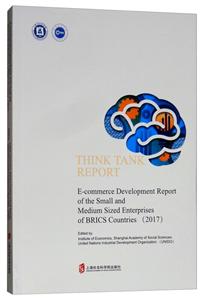-
>
营销管理
-
>
茶叶里的全球贸易史(精装)
-
>
近代华商股票市场制度与实践(1872—1937)
-
>
麦肯锡图表工作法
-
>
底层逻辑:看清这个世界的底牌
-
>
李诞脱口秀工作手册
-
>
成事:冯唐品读曾国藩嘉言钞
金砖国家中小企业电子商务报告2017(英文版) 版权信息
- ISBN:9787552024821
- 条形码:9787552024821 ; 978-7-5520-2482-1
- 装帧:一般胶版纸
- 册数:暂无
- 重量:暂无
- 所属分类:>>
金砖国家中小企业电子商务报告2017(英文版) 内容简介
近几年来,金砖国家电子商务的快速增长令全球瞩目,金砖国家电子商务与中小企业的发展对经济和就业的作用及影响日益突出。为促进中小企业和电子商务发展,从而促进包容可持续工业发展. 《金砖国家中小企业电子商务发展报告(2017 英文版)》比较完整地分析和揭示了金融危机以来金砖国家电子商务与中小企业的发展及现状特征,探讨了金砖各国在电子商务发展进程中面临的问题以及挑战。在全球贸易标准和贸易协定谈判日益复杂、利益冲突日益尖锐的背景下,报告也特别探讨了金砖国家在电子商务发展的相关法律法规与制度现状和可能推动金砖国家电子商务贸易健康快速发展的贸易规则和标准制定,并对如何促进电子商务和中小企业发展提出了建议。
金砖国家中小企业电子商务报告2017(英文版) 目录
1.1 Overall Situation
1.2 Essential Features of SMEs and e-commerce in BRICS countries
1.3 Main Problems Faced by e-commerce SMEs
1.4 Rules and Standards of e-commerce Trade in BRICS Countries
1.5 Proposals t6 Strengthen E-commerce Cooperation between BRICSs SMEs
2.Current Global Trends of e-commerce
2.1 Overview of Current Global Trends in e-commerce
2.1.1 Market size and Growth Rates
2.1.2 B2B.e-commerce is the main force of global e-commerce activities
2.1.3 B2C e-commerce is more active and growing significantly faster than B2B
2.1.4 e-commerce development across different regions
2.1.5 Outstandingperformance of emerging economies in global retail e-commerce
2.1.6 Great potential inBRICS e-commerce markets
2.2 The Impact of e-commerce on Global Economy, Technology Progress and Job Development
2.2.1 Impact of ICT on e-commerce market allocative efficiency
2.2.2 E-commerce is changing traditional business, production and sales models
2.2.3 Development of e-commerce promotes technological progress
2.2.4 E-commerce facilitates the development of SMEs and employment growth through business model innovation
2.2.5 Promote the participation of SMEs in the global economy
2.3 Global Development Trend of e-commerce
2.3.1 Mobile e-commerce is becoming mainstream
2.3.2 Cross-border e-commerce will be greatlydeveloped
2.3.3 The e-commerce industry chain and service ecology form gradually
2.3.4 The impact of social media on e-commerce activities is becoming increasingly prominent
2.3.5 The global e-commerce will gradually shift to emerging regional markets
2.3.6 The e-commerce activities in SMEs will usher in an era of economic development
3.Current Status of E-commerce among SMEs
3.1 Brazil
3.1.1 Overall status of SMEs
3.1.2 Overall status of e-commerce development in Brazil
3.1.3 Development status of E-commerce among SMEs
3.1.4 Development status of cross-border e-commerce
3.1.5 Management institutions and policies
3.1.6 Case study: E-commerce sales optimization and expand overseas markets
3.2 Russia
3.2.1 Overall status of SMEs
3.2.2 Overall status of e-commerce development in Russia
3.2.3 Development status of SMEs e-commerce
3.2.4 Development status of cross-border e-commerce
3.2.5 Management institutions and policies
3.2.6 Case Study: e-commerce helped Afour to expand overseas
3.3 India
3.3.1 Overall status of SMEs
3.3.2 Overall status of e-commerce development in India
3.3.3 Development status of cross-border e-commerce
3.3.4 Management institutions and policies
3.3.5 Case study: Makemytrip use e-commerce to expand global market
3.4 China
3.4.1 Development status of SMEs
3.4.2 General situation of China's e-commerce development
3.4.3 E-commerce development status of SMEs
3.4.4 Development status of cross-border e-commerce
3.4.5 Regulatory departments and policies
3.4.6 Practice cases: The road of "Three Squirrels" to IPO
3.5 South Africa
3.5.1 Overall status of SMEs
3.5.2 Overall status of e-commerce development in South Africa
3.5.3 Development status of SMEs e-commerce
3.5.4 Management institutions and policies
3.5.5 Case study: UAfrica enhance efficiency with the cloud
4.Major Issues in the Development of e-commerce among BRICS SMEs
4.1 Common Issues in the Development of BRICS SMEs e-commerce
4.1.1 Information communication infrastructure still lags behind
4.1.2 Logistics could not meet the demand of rapidly growing e-commerce
4.1.3 Shortage of e-commerce related qualified personnel
4.1.4 Market regulation and credit-sys'tem need to be strengthened
4.1.5 The e-commerce regulatory system need to be further improved
4.2 Major Country Specific Issues Faced by SMEs in BRICS
4.2.1 Brazil
4.2.2 Russia
4.2.3 India
4.2.4 China
4.2.5 South Africa
5.The Laws, Regulations and Systems of e-commerce in BRICS Countries
5.1 The Status of Laws, Regulations, Standards, and Systems in BRICS Countries.
5.1.1 The laws and regulatory rules of e-commerce
5.1.2 E-commerce trade and investment policy
5.1.3 Data and security regulations for e-commerce
5.1.4 Protection of consumer rights, interests in e-commerce and protection of intellectual property rights
5.2 The Evaluation and Comparison of the Policy Standards of E-commerce in BRICS
5.2.1 Completeness evaluation: the integrity and systematic nature of legal norms
5.2.2 Convenience evaluation: support for trade and investment policy
5.2.3 Security evaluation: transaction security and consumer protection
5.3 The Establishment of Unified Standard for Cross-border e-commerce in BRICS
5.3.1 The significance of unifying the standard of cross-border e-commerce in BRICS countries
5.3.2 Difficulties in establishing unified standard of cross-border e-commerce in BRICS countries
5.3.3 Policy suggestions for establishing standard rules of cross-border e-commerce in BRICS Countries
6.Further Strengthen the BRICS National E-commerce Cooperation
6.1 Strategic Framework to Strengthen the E-commerce Cooperation between BRICS
6.2 Continue to Improve the Cooperation Mechanism to Promote BRICS E-commerce Development
6.2.1 Strengthen the consensus and vision of e-commerce cooperation
6.2.2 Strengthen the implementation to promote e-commerce
6.3 Strengthen the BRICS Capacity Building to Promote E-commerce Cooperation
6.3.1 Cooperation in infrastructure development
6.3.2 Cooperation on technical support for e-commerce development
6.3.3 Cooperation on e-commerce skill and professional training
6.4 Strengthen cross-border e-commerce cooperation among BRICS countries
6.4.1 Focus on strengthening the cross-border trade of the dominant BRICS products
6.4.2 Promote the development control of cross-border e-commerce and simplification of trade rules
6.4.3 Strengthen the security, legal cross-border delivery and cooperation of information and data exchange
6.5 Promote Cooperation and Development of SMEs in BRICS
References
金砖国家中小企业电子商务报告2017(英文版) 作者简介
上海社会科学院经济研究所,成立于1956年,主要从事政治经济学、西方经济学、经济思想史与经济史、人口资源与环境经济学、统计学与数量经济学等基础理论的研究。近年来,为顺应国家高端智库建设,经济研究所注重学科建设和智库发展双轮驱动。60多年来,上海社会科学院经济研究所云集了一批蜚声学界的经济学大师,形成了一批具有重要影响力的学术成果,打造了《上海经济发展蓝皮书》年度报告、《上海经济研究》期刊等一批学术品牌。近年来,上海社会科学院经济研究所加强同国内外学术机构、政府部门、社会组织和企业的交流,产出了大量决策咨询成果/联合国工业发展组织(UNIDO)(简称“工发组织”)成立于1966年,截至2017年12月31日,拥有168个成员国。作为联合国的一个专门机构,工发组织一直致力于促进减贫、包容性全球化和环境可持续的工业发展。2013年,工发组织《利马宣言》的通过和《2030年可持续发展议程》17项可持续发展目标的提出,赋予了工发组织新的使命,即推动成员国实现包容与可持续工业发展(ISID)以及可持续发展目标“建造具备抵御灾害能力的基础设施,促进具有包容性的可持续工业化,推动创新”。目前,工发组织以创造共享繁荣、提升经济竞争力和保护环境为宗旨,在农产工业和农村发展、贸易能力建设、质量基础设施建设、促进技术交流与转移、推动中小企业发展、促进性别平等、提高资源利用效率和低碳生产、推广清洁能源、执行多边环境协定等领域为成员国提供政策咨询,开展广泛的技术合作,为发展中国家和最不发达国家消除贫困,实现可持续发展作出了积极贡献,促进了世界发展与共同繁荣。
- >
烟与镜
烟与镜
¥14.4¥48.0 - >
我与地坛
我与地坛
¥27.2¥28.0 - >
巴金-再思录
巴金-再思录
¥14.7¥46.0 - >
上帝之肋:男人的真实旅程
上帝之肋:男人的真实旅程
¥19.3¥35.0 - >
诗经-先民的歌唱
诗经-先民的歌唱
¥13.5¥39.8 - >
月亮与六便士
月亮与六便士
¥18.1¥42.0 - >
人文阅读与收藏·良友文学丛书:一天的工作
人文阅读与收藏·良友文学丛书:一天的工作
¥14.7¥45.8 - >
名家带你读鲁迅:朝花夕拾
名家带你读鲁迅:朝花夕拾
¥10.5¥21.0
-
中国近代海关史
¥84¥200 -
开店做生意
¥19.2¥35 -
中国海关报关专业教材
¥26.6¥80 -
跨界战争:商业重组与社会巨变
¥42.3¥59 -
创业维艰 如何完成比难更难的事
¥49.3¥69 -
运营之路:数据分析+数据运营+用户增长
¥74.3¥99





















